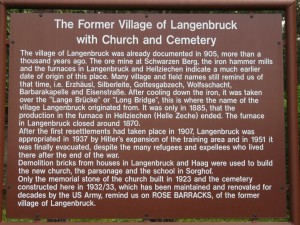There is an old German cemetery on Rose Barracks that I have driven past hundreds of times and never stopped to look at. I finally did today and was surprised. I thought it was a military cemetery like the POW cemetery in Grafenwohr but it is not. It is a village cemetery from one of the villages that was moved when the training area was established in the early 20th century. There are several other abandoned villages on Grafenwohr Training Area, most of them are inside the impact area and off limits, there is one other in the maneuver area that still has the shell of a church and has been a reference point that anyone who has ever trained at Graf knows about. Ask anyone who trained at Graf about the Hofenohe Church and they have probably walked through the ruins.
The Cemetery on Rose Barracks is for the village of LangenBruck. As the information panel states, the village dates back to 905. Someone visits the cemetery as there were candles on several of the graves and some of the graves have what looks to be fairly new headstones on them.
I will post the photos below with short explanatory captions. The photos are compressed due to their large size but if anyone wants the original photos email me and I will be happy to send you a copy of the originals.

There are more photos below the fold.
